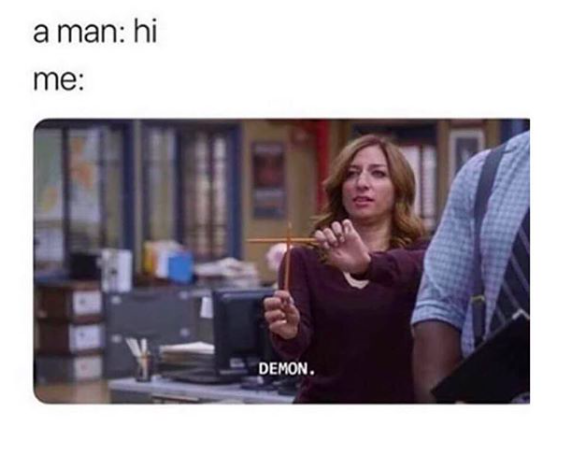They say to never let a fool kiss you or a kiss fool you. Dating, in whatever shape or form it may come in, has been part of pop culture for as long as pop culture has existed, meaning its purpose to find a mate—for reason, season or for life—is propelled again and again, in every imaginable format, into the forefronts of our minds. Finding a partner can, for many, rise far above any other set goal, and while that’s not necessarily a bad thing, our crusade for companionship brings along a fair share of side effects to everyone involved, passively or actively.
Some of these side effects can most certainly be attributed to social media and, more specifically, dating apps and their constant blurring of what is real and authentic versus filtered self-presentations on the internet. “Ghosting“, “breadcrumbing” or whatever we wish to call it is no smartphone-era-exclusive phenomenon though. As we binge-watch our way through ’90s sitcoms à la Friends on Netflix, we come to notice that—despite the fact that dating actually used to come about through face-to-face altercations at bars, cafés or clubs—waiting in vain for last night’s flirt to “leave a message after the beep” is just as frustrating as being left-on-read.
Because, maybe, not everyone has experienced the aforementioned situations, it makes sense to elaborate on what some of these Urban-Dictionary-heavy-rotation terms even mean. Because, no, in actuality it doesn’t have all that much to do with, for instance, Ariana Grande’s (truth be told, gut-wrenching) track about her then-boyfriend wanting her to leave the memories of a past lover behind. Ghosting is when someone, however long you may have known them or however much time you may have spent with them, discontinues all threads of communication. Be it Whatsapp messages, Instagram DMs or Tinder chats—suddenly, you find yourself in a compromising position: Do you accept the fact that this person most probably wants to cut you out of their life for undisclosed reasons, or will you walk the extra mile, screw it and call them out for ignoring you? It’s these mind games that have, for many a millennial, turned what could or should be a somewhat fun and respectful playing ground to pursuit romantic happiness into a toxic battlefield of non-commitment-culture.
Particularly major cities like Berlin—in contrast to many newcomers’ hope to find that special someone—have a bad rep for dating. With more than half the German capital’s population claiming to be single (2014), one would think this to be the mecca for lonely hearts. Nevertheless, any here-living human can attest to the fact that dating in Berlin is far from easy, with promiscuity and sex-capades seeming to be more common than commitment. The metropolis’ hedonistic overstimulation in just about every of its many layers and the accompanying fear of settling on second- instead of first-bests create notorious opportunism—access to more hook-up-apps than one hand can count only further fuelling these difficult discrepancies.
Almost ironically, the global obsession with Reality TV dating formats—think Love Island, The Bachelor(-ette) or MTV’s all new, more progressive season of Are You the One?, featuring a cast of sexually fluid contestants—feels more intense than ever. With participants circumstantially incapable of avoiding awkward, uncomfortable confrontation, these shows ultimately want to have you believe that one is somewhat bound to fall in love so long the two people in question spend enough time together in an unrealistic setup.
As to be read in this very recent Reddit discussion, “ghosting” appears to be most prevalent when there are men involved, meaning either in gay or heterosexual dating contexts. That’s not to say that not every single one of us, regardless of who we like and what we identify as isn’t capable of said method, but one can’t talk dating as a digital native without involving the hilariously and quite frankly painfully accurate meme-verses such as, for example, @best_of_grindr and @zero_fucksgirl, both of which cater to well over a million sufferers of strugglesome single life.

Scratching beneath the surface of the humorous contents served to those who collectively relate to not being replied to, those suddenly ditched after putting out the other night or the like, a certain dyad shimmers through: On one hand, we see people with hurt feelings, people who cluelessly try to comprehend what it might’ve been that drove their once-potential counterpart away, while on the other we find an almost worrying amount of tweets and captions along the lines of “me when he doesn’t reply after two minutes”, featuring videos or images of overly devastated, out-of-context cartoon(-ish) characters. What this may show is a questionable, alleged correlation between phone activity and interest in the other person.
In a day and age when notifications reach us any place, any way, any time, we grow heavy in expectation towards other people’s engagement, aiming to measure someone else’s opinions on us by the speed of their reaction to whatever pointful or -less message we sent. It’s absolutely justified to feel offended if someone doesn’t treat you the way you’d like to be treated—that being said though, we mustn’t forget that it takes two to tango. Not always do people have the same agenda we do, not always will whatever we wish it to turn out as align with what the other person sees in their future, and that’s okay. It should never be too much to ask to be dealt with with respect. And yes, that also entails a certain amount of empathy, such as telling someone the truth as opposed to vanishing without a warning. Ghosting hurts. Taking someone’s time and emotional energy for granted sucks. Retreating from any type of accountability is plain coward.
So, as it requires barely an effort and bares no more but only less risks of hurting someone’s feelings, next time maybe consider “Caspering“. The term is derived from—you guessed it—Casper the Friendly Ghost, and asks of you nothing more than to just be quick and honest, even if it’s painful. Rip the band-aid off. You’ll appreciate it, the other one will, too, and the other one’s friends will, three. Finally, to quote what goddess and patron saint of hopeless romantics Stevie Nicks once so wisely chanted on Fleetwood Mac’s hit ‘Dreams‘: “Players only love you when they’re playing”. And as much as we love to indulge in the idea that it’s always someone else’s fault, not our’s, most of us will surely recall a situation in which we may have been said player to someone else without even realising it. But dating is a game (at least) two people play. So, maybe, don’t hate the player, hate the game.
Head Image via @zero_fucksgirl

